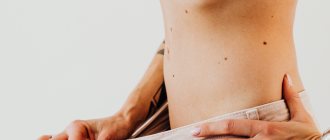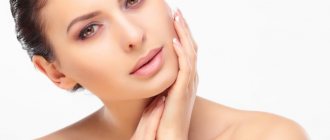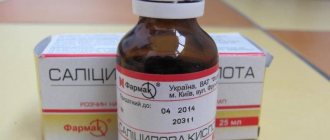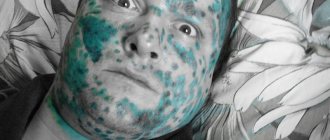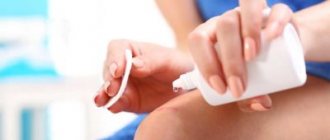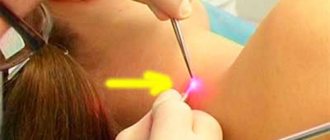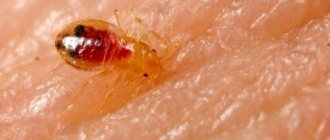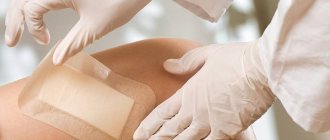Recently we received a question from our reader, after the publication of the article “SPA without a budget! Or an evening of pleasure without leaving home.” In it we talked about how taking a relaxing bath can improve your well-being and relieve emotional stress.
The question was: “I have sensitive skin and after a bath my body becomes covered with red spots. What do you advise?
Yes, this is indeed a burning topic. Due to hard and chlorinated water, many women now experience discomfort after taking a bath and do not even wash their face with tap water. But it’s one thing to experience unpleasant sensations, and another when it’s already on the body - redness.
Let's look at the main reasons.
Allergy
If the body is prone to allergies, then our skin can react to any irritant.
Common allergens:
— Various additives in centralized hot water (Chlorine, Iron, Aluminum...); — Any component included in a cosmetic product (shower gel, soap, bath foam, shampoo, etc.); — Residues of detergent on the bathroom. All cleaning products are very caustic and aggressive, and our skin often suffers from contact with them.
- Recommendations:
- If you suspect that you have an allergy, or are already 100% sure, then first of all you need to eliminate the source of irritation.
- If you don’t fully understand what the reaction is, try taking a bath and changing cosmetics every time. When a malicious bubble is discovered, read the ingredients and try to avoid similar components in the future.
- If you suspect chlorine, iron, aluminum..., conduct an experiment. Pre-boil the water and let it settle. Take a swim in this water. Then watch the reaction.
- Avoid chemicals when cleaning your bathtub. Try using baking soda to clean surfaces.
- If an allergen is identified, and for some reason you cannot eliminate it, or you have not found the source of irritation. Be sure to consult a doctor. An experienced specialist will help solve the problem.
.
Diagnosis and methods of eliminating allergic itching
If a person’s body itches after a shower, first of all you need to find out why it happened. We mentioned above that there are many reasons for this phenomenon, from the most harmless urticaria to serious systemic diseases, which without treatment can lead to serious health problems.
One of the preventive measures for itching is proper nutrition. All fried, spicy, salty foods and strong tea and coffee also lead to itching. You need to stop eating unhealthy foods or at least reduce their quantity. A proper diet normalizes the functioning of internal organs and improves your mood. At the same time, you need to consume vitamins, iodine-containing products, and more fruits and vegetables.
You may also need to change your skin care products, as they can also cause irritation. The easiest way is to use hypoallergenic products or baby soap. This will relieve you of allergic problems.
If all preventive measures do not help, you should definitely consult a specialist. The doctor will prescribe the necessary tests that will help determine the cause of the disease, and then prescribe the required treatment. We must not forget about this, since timely diagnosis and properly initiated therapy will help a person live a long life.
Close location of capillaries to the surface of the skin
Another reason for redness. From irritation and hot water, the vessels dilate and become more visible than usual.
- Recommendations:
- We exclude: rubbing the skin with a hard washcloth, cosmetic scrubs and peels, sudden changes in water.
- If you are a fan of high temperatures, then redness will appear again and again. Take a bath with moderate or even slightly cool water temperature. Reduce the temperature gradually; you can use a special thermometer to control the process. For example, reduce by 1 degree every month. Important!
Lying in cool water for a long time is, of course, not recommended, here you focus on comfort, usually it is about 37-40 degrees. But for the shower you can use less. But remember that a cold shower is already hardening, and a special approach is needed here.
Other Possible Causes
Skin allergies due to excessive production of thyroid hormones are associated with the formation of kinins, a rise in body temperature and xerosis.
Itching associated with liver disease is provoked by a high content of bile acids in the blood or prostaglandins and histamine. The allergy is generalized and worsens when pressing on the skin, as well as at night. You need to be attentive to such manifestations, otherwise hemochromatosis may occur.
In case of skin diseases, itching does not depend on water. It’s just that such procedures can spread microorganisms throughout the body.
If you have worms, your body itches after a shower, this is due to the processes of poisoning the body with waste products of parasites.
Nervous system disorders
Stress, nervousness, an unfavorable emotional environment at home or at work - all this can be reflected in red spots on the body. In this case, the bath serves as a kind of accelerator that brings out all your experiences.
- Recommendations:
- Analyze the situation, perhaps you will find a certain pattern.
- You can drink herbal soothing infusions yourself. Spend more time outdoors and relax.
- If you feel that you cannot cope on your own, consult a doctor. Sometimes stress is of a deeper nature, then it is advisable to undergo a course of drug therapy.
Sensitive skin.
Sensitivity can be with you almost all your life, or it can appear suddenly.
Symptoms of sensitive skin:
— Excessively whitish tint of the skin; - Tightening sensation after taking a bath; - Irritations that sometimes arise “out of the blue”; — Tendency to form pigment spots; - You periodically experience: burning, swelling, tingling, redness, itching, peeling; — Susceptibility to ultraviolet rays (leading to burns).
- Recommendations. What it is not advisable to do if you are hypersensitive:
- Take an excessively hot bath;
- Rub the skin with a hard washcloth;
- Use scrub or peeling frequently;
- Clean the bathtub with aggressive chemicals
- From various bath foams, gels, soaps - having a hard or “questionable” composition;
- Add salt and/or potent essential oils to the bath.
What is better to avoid:
Beauty tip:
— Buy eco-friendly or natural body cosmetics, without chemical components; — Or try making homemade cosmetics yourself; — Take a bath with herbal infusions. Choose those that will relieve irritation and soothe sensitive skin - Install a main filter for water purification (today this is an excellent solution for any skin type)!
Diseases of internal organs
If all of the above reasons do not apply, we can assume some kind of internal organ disease. Our body is an integral and complex system; when one organ is disrupted, there is often a reaction to another. And since the skin is our largest organ, we can observe a side effect - from the outside.
- Recommendations: There is only one recommendation here - consult a doctor. Perhaps by external manifestations our body, as it were, “draws attention” to a more important problem.
In this article, we briefly examined the main reasons why red spots may appear on the body after taking a bath. If you, like our reader, want to eliminate this unpleasant symptom, write in the comments:
- Was this article useful to you?
- Why do you think red spots may appear?
- What information did you miss, and maybe the next article will reveal it in more detail?
Thank you for your attention!
Author of the article: Lina Zdorovie Official website of the author: LinaBlog.ru Instagram:@linazdorovie
Why does the skin on the body become covered with spots?
If red spots appear on the skin after a normal daily shower, this may be the result of completely natural factors:
- Various intensity of soaping with a washcloth (pronounced friction).
- The use of rather aggressive detergents that irritate the skin.
- Irritation from too hot or cold water.
- Applications of a contrast shower.
- Using scrubs and other exfoliating products or products with peeling properties.
- Application of different compositions for depilation of arms, legs and bikini area.
Natural spots on the skin go away quite quickly and do not cause discomfort. Such marks are completely harmless to health.
The face becomes red
Natural redness of the face after a shower or bath is the result of the activity of the autonomic nervous system. If there is an imbalance in its work, the skin on the face may become covered with uneven spots. This symptom is also not dangerous and does not cause any discomfort. However, it is a reason to listen more closely to the work of your body. After all, insufficiently stable functioning of the autonomic nervous system can also manifest itself:
- Unmotivated anxiety, insomnia, nervousness.
- Frequent heartbeat.
- Pressure changes.
- Nausea, dizziness, faintness.
- Panic attacks.
- Extreme heat, sweating, feeling of lack of air, etc.
In fact, an imbalance in the functioning of the autonomic nervous system in itself is not dangerous. However, progressive problems are fraught with a strong deterioration in well-being and emotional state.
Skin turns red due to taking a bath
If redness on the body appears exclusively after taking a bath, its formation may be associated with the duration of the water procedure or the scale of the influence of water. Red spots may occur due to:
- The factors already listed, in particular, exposure to washcloths, scrubs, and too hot water.
- The characteristics of the water itself, in particular, the presence of chlorine and other impurities in it (this type of redness is not an allergy, but rather has the appearance of irritation).
- The presence of skin diseases that are activated and manifest massively after prolonged exposure to water. Eczema, psoriasis and some dermatitis can behave this way.
If the skin turns red only after a bath, and this becomes the cause of discomfort, it is better to abandon long-term water procedures and switch only to a shower.
Redness appears due to allergies
Allergic reactions on the body when taking a shower can occur to anything. In particular, provocateurs can be:
- All detergents. The skin may become covered with pimples or blisters, become red and very itchy.
- Water components (additives used to purify it).
- The procedure itself, in particular with cholinergic urticaria, the skin may turn red and blister in response to taking a hot shower (especially if it occurs after physical activity). The disease can manifest itself in different parts of the body, with the exception of the palms and soles. Elements of the rash itch, but disappear on their own without a trace after a maximum of an hour.
If you ignore allergy symptoms, they can progress and even become dangerous. In particular, if unpleasant symptoms are caused by detergents, further use of allergens is fraught with the development of Quincke's edema and suffocation.
Aquagenic urticaria - water intolerance
Aquagenic urticaria is a fairly rare condition in which the skin becomes covered with painful red blistering spots upon any contact with water. Scientists cannot accurately identify the causes of the development of such a disease and cannot offer methods to combat such a disease.
In some cases, water allergies occur when only a certain type of water is used, such as tap water. It is worth switching to distilled water, and the unpleasant symptoms will decrease or disappear completely.
If an allergic reaction occurs on the skin after a shower or bath, you should consult with a competent allergist. A specialist will help identify the exact allergen or confirm the risk of having aquagenic urticaria.
